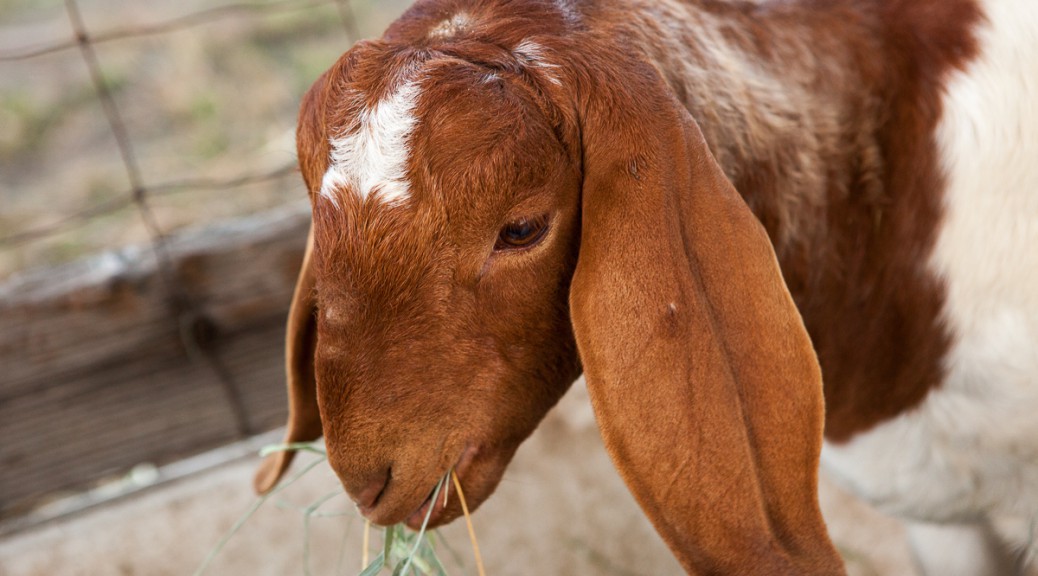[Image: Luv, a goat at PreetiRang Sanctuary, munches on hay.]
Whenever the subject of veganism comes up, discussion of what the “natural” diet is for humans inevitably follows. Words such as omnivore, carnivore, herbivore, and frugivore are thrown around without much understanding of what they actually mean. Here are some handy definitions from Wikipedia:
Omnivore: An animal whose species normally derives its energy and nutrients from a diet consisting of a variety of food sources that may include plants, animals, algae, fungi and bacteria.
Carnivore: An organism that derives its energy and nutrient requirements from a diet consisting mainly or exclusively of animal tissue, whether through predation or scavenging.
Herbivore: An animal anatomically and physiologically adapted to eating plant material, for example foliage, for the main component of its diet.
Frugivore: A fruit eater. It can be any type of herbivore or omnivore where fruit is a preferred food type.
I believe it’s clear that we are not carnivores, which is part of why I do not refer to humans who eat animal flesh as such. As for whether we are omnivores, herbivores, or frugivores, I’ve seen good evidence that we likely fall into the last category, keeping in mind that frugivores do not eat fruit exclusively, and that the botanical definition of fruit is much broader than the culinary term.
Regardless, I believe all this focus on dietary terms is a distraction. None of us in modern society live or eat the way that our primitive ancestors did. Humans are able to derive all nutrients except for Vitamin B12 from plant sources exclusively. As long as we have access to adequate sources of calories from whole plant foods, we can live healthily without eating animal products.
What about B12? It is made neither by animals nor plants, but by bacteria. The amount we humans need is minuscule, and supplements are inexpensive. Some vegans try to get enough B12 without supplementing by eating slightly dirty produce, but I prefer to take a pill once a week rather than eat plants covered with feces.
What about those who cannot access or afford supplements, or encounter serious health problems on a vegan diet? My position is that if your life or health literally depends on eating animal products, then do so, but only as much as you actually need to. Vegan physician Michael Klaper discusses a possible reason some may fail to thrive on a vegan diet here:
Being surrounded by friends, family, and advertisements constantly encouraging us to eat animal products makes it very easy to revert to eating them upon experiencing any ill symptoms from starting a vegan diet. I believe that in a post-speciesist world, true cases of people who have full access to plant foods but get very sick without eating animal products would be exceedingly rare.
While I could imagine various strategies to help those who fail to thrive in such a world, I would like to focus on getting to that world first. When every promotion of veganism is countered with reasons why “not everyone can go vegan,” the voices of those harmed – our fellow animals – are lost. When society comes to realize that animals are people, not property, we can focus on their needs and wants, not just those of humans.

2 thoughts on “The “natural” human diet”
Comments are closed.